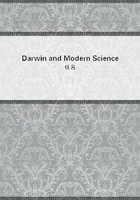
第251章
It was, then, not entirely a foreign point of view which Darwin introduced into ethical thought, even if we take no account of the poetical character of the word "struggle" and of the more direct adaptation, through the use and non-use of power, which Darwin also emphasised. In "The Descent of Man" he has devoted a special chapter ("The Descent of Man", Vol. I. Ch. iii.) to a discussion of the origin of the ethical consciousness. The characteristic expression of this consciousness he found, just as Kant did, in the idea of "ought"; it was the origin of this new idea which should be explained. His hypothesis was that the ethical "ought" has its origin in the social and parental instincts, which, as well as other instincts (e.g. the instinct of self-preservation), lie deeper than pleasure and pain. In many species, not least in the human species, these instincts are fostered by natural selection; and when the powers of memory and comparison are developed, so that single acts can be valued according to the claims of the deep social instinct, then consciousness of duty and remorse are possible.
Blind instinct has developed to conscious ethical will.
As already stated, Darwin, as a moral philosopher belongs to the school that was founded by Shaftesbury, and was afterwards represented by Hutcheson, Hume, Adam Smith, Comte and Spencer. His merit is, first, that he has given this tendency of thought a biological foundation, and that he has stamped on it a doughty character in showing that ethical ideas and sentiments, rightly conceived, are forces which are at work in the struggle for life.
There are still many questions to solve. Not only does the ethical development within the human species contain features still unexplained (The works of Westermarck and Hobhouse throw new light on many of these features.); but we are confronted by the great problem whether after all a genetic historical theory can be of decisive importance here. To every consequent ethical consciousness there is a standard of value, a primordial value which determines the single ethical judgments as their last presupposition, and the "rightness" of this basis, the "value" of this value can as little be discussed as the "rationality" of our logical principles. There is here revealed a possibility of ethical scepticism which evolutionistic ethics (as well as intuitive or rationalistic ethics)has overlooked. No demonstration can show that the results of the ethical development are definitive and universal. We meet here again with the important opposition of systematisation and evolution. There will, Ithink, always be an open question here, though comparative ethics, of which we have so far only the first attempts, can do much to throw light on it.
It would carry us too far to discuss all the philosophical works on ethics, which have been influenced directly or indirectly by evolutionism. I may, however, here refer to the book of C.M. Williams, "A Review of the Systems of Ethics founded on the Theory of Evolution" (New York and London, 1893.), in which, besides Darwin, the following authors are reviewed: Wallace, Haeckel, Spencer, Fiske, Rolph, Barratt, Stephen, Carneri, Hoffding, Gizycki, Alexander, Ree. As works which criticise evolutionistic ethics from an intuitive point of view and in an instructive way, may be cited:
Guyau "La morale anglaise contemporaine" (Paris, 1879.), and Sorley, "Ethics of Naturalism". I will only mention some interesting contributions to ethical discussion which can be found in Darwinism besides the idea of struggle for life.
The attention which Darwin has directed to variations has opened our eyes to the differences in human nature as well as in nature generally. There is here a fact of great importance for ethical thought, no matter from what ultimate premiss it starts. Only from a very abstract point of view can different individuals be treated in the same manner. The most eminent ethical thinkers, men such as Jeremy Bentham and Immanuel Kant, who discussed ethical questions from very opposite standpoints, agreed in regarding all men as equal in respect of ethical endowment. In regard to Bentham, Leslie Stephen remarks: "He is determined to be thoroughly empirical, to take men as he found them. But his utilitarianism supposed that men's views of happiness and utility were uniform and clear, and that all that was wanted was to show them the means by which their ends could be reached." ("English literature and society in the eighteenth century", London, 1904, page 187.) And Kant supposed that every man would find the "categorical imperative" in his consciousness, when he came to sober reflexion, and that all would have the same qualifications to follow it.
But if continual variations, great or small, are going on in human nature, it is the duty of ethics to make allowance for them, both in making claims, and in valuing what is done. A new set of ethical problems have their origin here. (Cf. my paper, "The law of relativity in Ethics,""International Journal of Ethics", Vol. I. 1891, pages 37-62.) It is an interesting fact that Stuart Mill's book "On Liberty" appeared in the same year as "The Origin of Species". Though Mill agreed with Bentham about the original equality of all men's endowments, he regarded individual differences as a necessary result of physical and social influences, and he claimed that free play shall be allowed to differences of character so far as is possible without injury to other men. It is a condition of individual and social progress that a man's mode of action should be determined by his own character and not by tradition and custom, nor by abstract rules. This view was to be corroborated by the theory of Darwin.